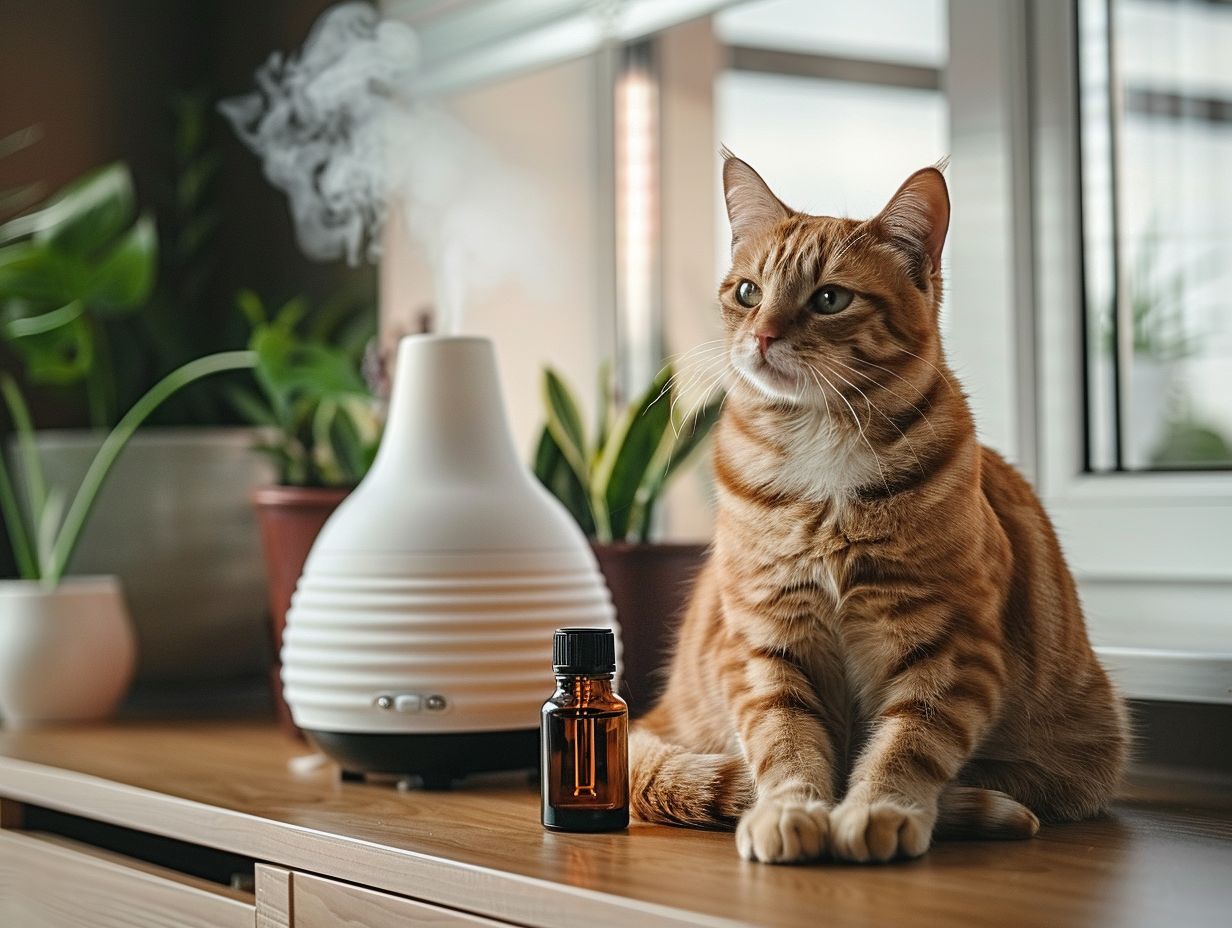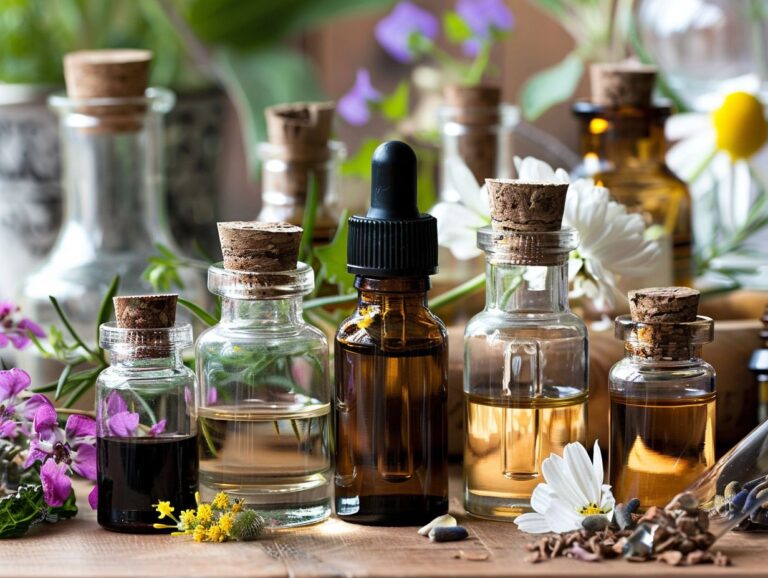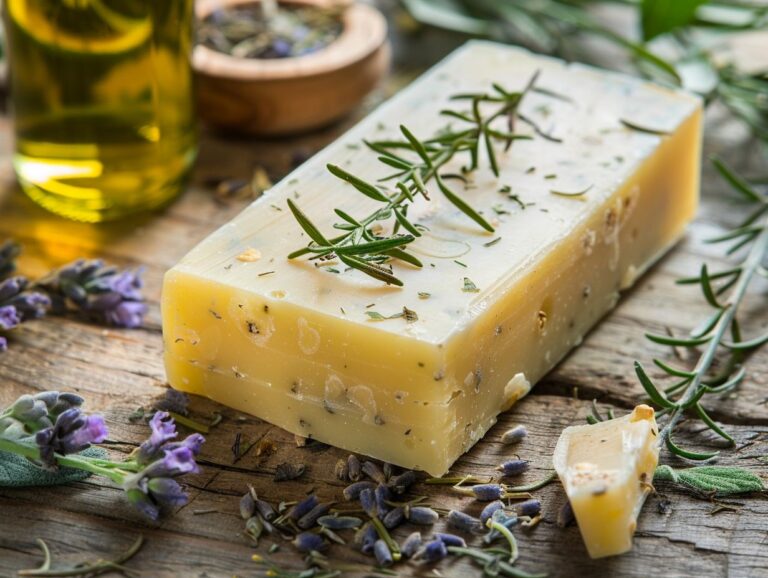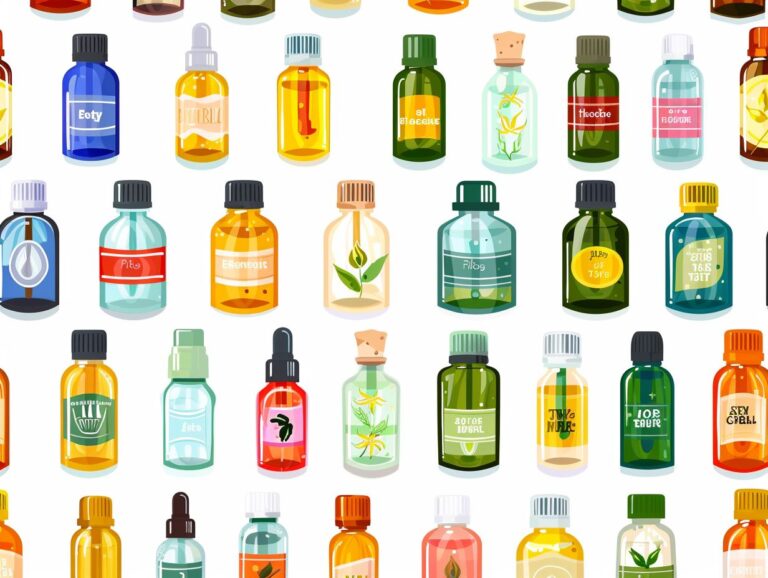Can Aromatherapy Be Used to Reduce Anxiety in Hospitalised Felines
Curious about how aromatherapy can benefit your furry feline friends?
We explore the world of aromatherapy and how it can be used to reduce anxiety in hospitalised cats.
Learn how aromatherapy works and the benefits of specific essential oils for cats.
If you want to create a calming environment for your beloved cat, keep reading to discover the wonders of aromatherapy.
Key Takeaways:
What is Aromatherapy?
Aromatherapy is a holistic healing treatment that uses natural plant extracts, known as essential oils, to promote physical, emotional, and mental well-being. It is a complementary therapy that aims to improve a person’s health and mood by inhaling or applying these essential oils.
Rooted in ancient civilizations like Egypt, India, and China, aromatherapy has been practiced for centuries, with the belief that these fragrant oils possess therapeutic properties. The principles of aromatherapy revolve around the idea that inhaling essential oils can stimulate brain function, influencing emotions and triggering physical responses. Apart from its calming effects, aromatherapy is also used to alleviate stress, headaches, and insomnia, making it a versatile treatment option.
How Does Aromatherapy Work?
Aromatherapy works by stimulating smell receptors in the nose, which then send messages through the nervous system to the limbic system – the part of the brain that controls emotions. This process triggers the release of chemicals that can make you feel more relaxed, calm, or energized.
When essential oils are inhaled, they interact with olfactory receptors in the nasal cavity, which are connected to the limbic system. This direct connection allows the volatile compounds in the oils to influence mood, stress levels, and even memory.
Research has shown that certain scents like lavender can have a calming effect, while peppermint may boost focus and alertness. The individual responses to different aromas can vary based on personal preferences and past experiences, making aromatherapy a versatile and personalized approach to well-being.
Can Aromatherapy Be Used for Animals?
Aromatherapy can indeed be used for animals, including pets like cats and dogs. Veterinary nurses, under the guidance of veterinarians, may utilize aromatherapy techniques to help reduce anxiety and promote emotional balance in hospitalised felines and canines.
One significant advantage of incorporating aromatherapy in veterinary care is its potential to enhance the overall well-being of animals by addressing both physical and emotional aspects of their health.
Essential oils, known for their therapeutic properties, are carefully selected and diluted by trained professionals to ensure safe application in veterinary settings.
For example, lavender oil is commonly used to calm anxious pets during grooming sessions or veterinary visits, while chamomile oil can aid in promoting relaxation and sleep in stressed animals.
What Animals Can Benefit from Aromatherapy?
A variety of animals, including hospitalised felines and canines, can benefit from aromatherapy. Veterinary nurses trained in holistic cat care and integrative medicine may use aromatherapy techniques to support the emotional and physical well-being of these pets.
While dogs and cats are commonly recipients of aromatherapy treatments, other creatures like horses, rabbits, and even birds can also find relief from stress and anxiety through the use of essential oils. Veterinary nurses play a crucial role in identifying the most suitable essential oils and application methods for each animal species. By incorporating aromatherapy into their practice, these professionals enhance the overall quality of care provided to their animal patients, promoting a more comfortable and soothing environment during their recovery process.
What Are the Benefits of Aromatherapy for Cats?
Aromatherapy offers several benefits for cats, including reducing anxiety, promoting emotional balance, and addressing behavior problems. These therapeutic effects can help improve the overall well-being and quality of life for feline companions.
Reducing anxiety is a crucial aspect of feline health, as stressed cats may exhibit destructive behavior or health issues. Aromatherapy, with its calming scents like lavender or chamomile, can create a soothing environment that helps cats relax. By promoting emotional balance, essential oils like frankincense or geranium can support cats in managing their responses to stress triggers and emotional fluctuations.
In addition, addressing specific behavior problems through aromatherapy can lead to positive changes in a cat’s demeanor. Essential oils such as cedarwood or vetiver can aid in managing issues like excessive meowing, aggressiveness, or territorial behavior, fostering a more harmonious relationship between feline companions and their owners.
Reduces Anxiety and Stress
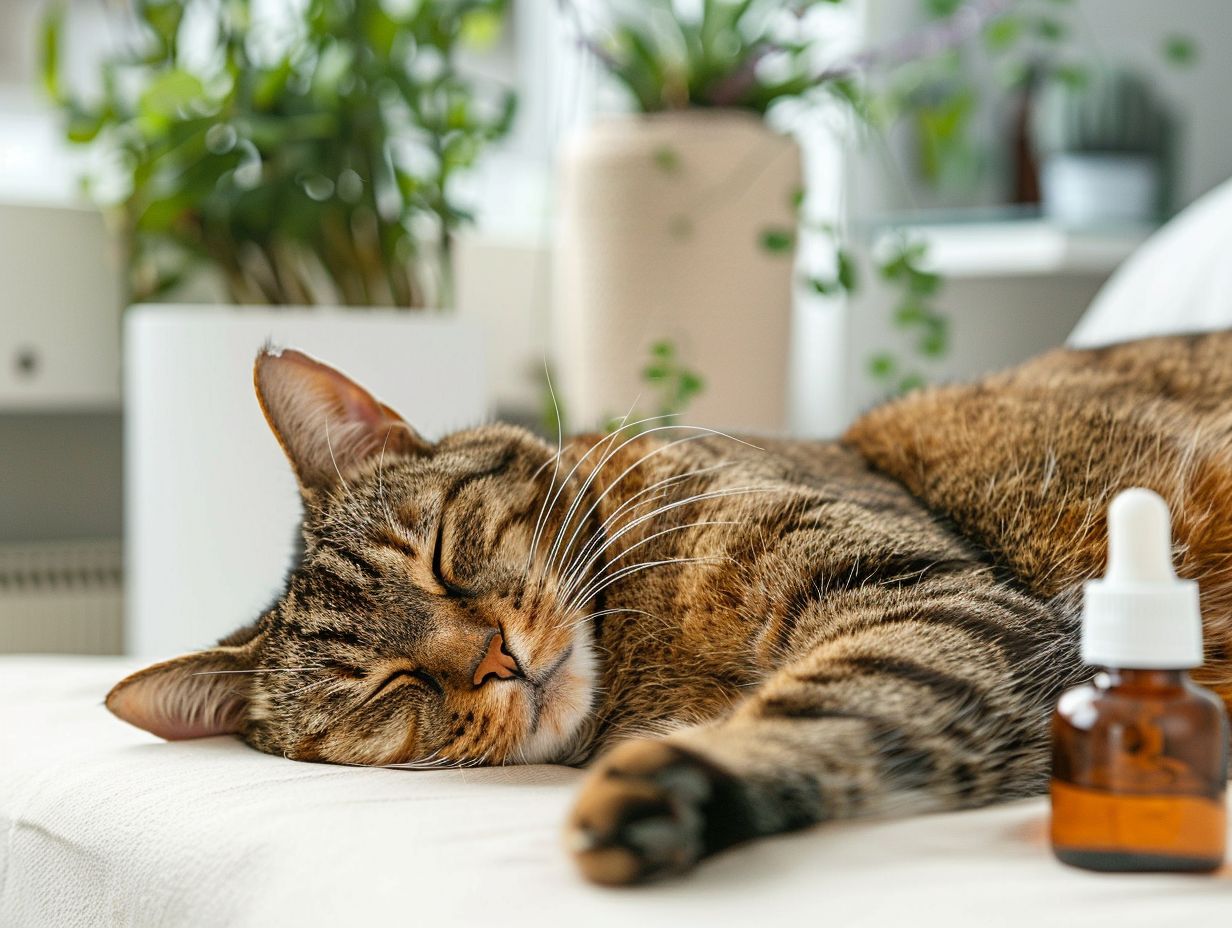
Calming essential oils such as lavender, chamomile, and frankincense are known for their soothing properties that can have a positive impact on a cat’s emotional well-being. Specifically, lavender is often used to promote relaxation, chamomile is known for its calming effects, and frankincense can help alleviate stress and anxiety in feline patients.
In terms of application, diffusing essential oils in a room where the cat spends time, creating a calming spray to mist on their bedding, or using a specially designed collar infused with essential oils are popular aromatherapy techniques used to promote emotional balance in cats.
Promotes Relaxation
Aromatherapy promotes relaxation in cats by creating a soothing environment with the use of calming scents. This can help felines unwind, destress, and find comfort in their surroundings.
The use of essential oils plays a significant role in achieving these calming effects. Oils like lavender, chamomile, and valerian are known for their calming properties in cats. When diffused in the air or applied topically in a diluted form, these essential oils can positively impact a cat’s emotional state, reducing anxiety and promoting relaxation.
Eases Respiratory Issues
Aromatherapy can also help ease respiratory issues in cats, as certain essential oils possess properties that may support respiratory health and comfort. By using aromatherapy techniques, pet owners and veterinary professionals can aid felines with breathing difficulties.
For instance, eucalyptus oil is widely recognized for its decongestant and expectorant qualities, making it a popular choice for alleviating respiratory congestion in cats. Similarly, peppermint oil is known for its ability to help clear the respiratory tract and promote easier breathing. When using essential oils for cats, it is crucial to dilute them properly and consult with a veterinarian to ensure safety and effectiveness.
Boosts Immune System
Aromatherapy has been suggested to potentially boost the immune system of cats, especially when combined with herbal remedies or Neutraceuticals. By incorporating immune-supporting essential oils, pet owners and veterinary professionals can aid in strengthening feline immunity.
Essential oils such as frankincense, tea tree, and lavender are known for their immune-boosting properties in cats. These oils can be diffused in the environment or diluted for topical application to provide holistic immune support.
Herbal remedies like Echinacea and Astragalus, along with Neutraceuticals such as beta-glucans and probiotics, can work synergistically with aromatherapy to enhance the overall health and immunity of feline companions.
What Essential Oils Are Safe for Cats?
When using aromatherapy for cats, it is crucial to consider the safety of essential oils. According to research published in the Iranian Journal of Nursing and Midwifery Research and veterinary resources like Veterinary Times, certain essential oils such as Lavender, Chamomile, Valerian, and Frankincense are considered safe for feline use.
These essential oils are not only safe but also offer various benefits for cats:
- Lavender, known for its calming properties, can help alleviate stress and anxiety in felines.
- Chamomile is another great option that promotes relaxation and aids in digestion.
- Valerian is often used to support nervous system health and improve sleep quality in cats.
- Frankincense has anti-inflammatory properties and can assist in boosting immunity.
It is important to always dilute essential oils properly before using them on cats, and it is advisable to consult with a veterinarian before introducing any new oils into their routine. Despite the safety of these essential oils, it is essential to monitor your cat’s reaction when using aromatherapy and discontinue use if any adverse effects are observed.
Lavender
Lavender is one of the safe essential oils for cats, known for its calming and stress-relieving properties.
When incorporated into a cat’s environment with caution, Lavender can create a serene atmosphere, promoting relaxation and reducing anxiety levels. The gentle aroma of Lavender can be diffused in the air or applied diluted topically to help soothe nervous felines. This essential oil can aid in improving sleep quality for cats, making it particularly beneficial for restless or agitated pets. Always ensure proper dilution and avoid direct ingestion, as feline metabolism can differ from humans’. Through responsible use, Lavender essential oil can be a valuable tool for supporting your cat’s emotional well-being.
Chamomile
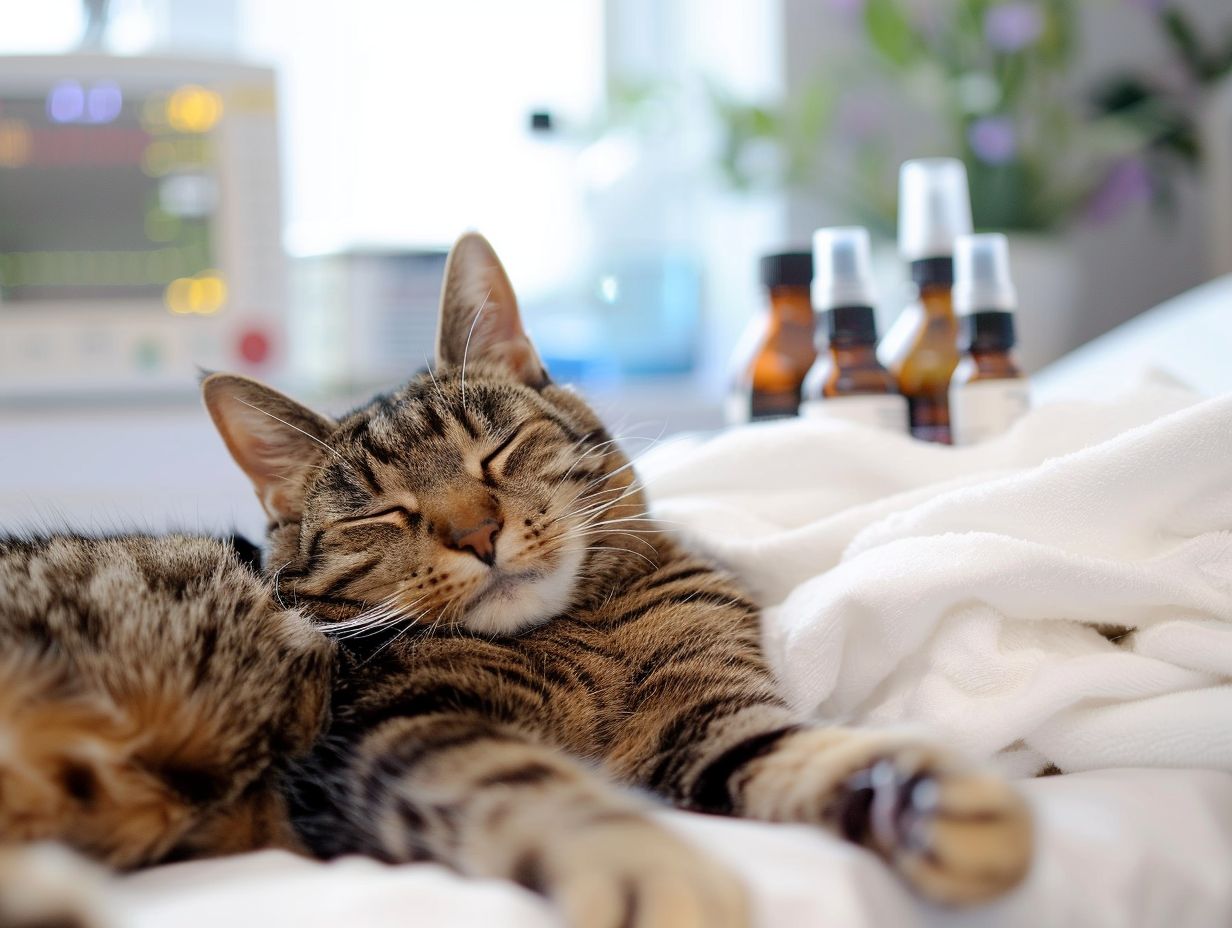
Its gentle nature makes it a popular choice among pet owners looking for natural remedies to support their feline companions well-being. The therapeutic benefits of Chamomile essential oil extend beyond just its calming effects, as it is also known for its anti-inflammatory properties. When diffused in the air or diluted for topical application, Chamomile can help alleviate skin irritations and promote a sense of tranquility in cats.
Chamomile is considered safe for cats when used in moderation and following proper guidelines. It is important to consult with a veterinarian before introducing any essential oils to your pet’s routine, ensuring that the application is appropriate for your cat s specific needs and health conditions.
Valerian
Valerian is a feline-safe essential oil known for its sedative and calming effects. When used appropriately, Valerian can help cats manage anxiety, sleep disturbances, and stress-related behaviors.
Many cat owners turn to Valerian essential oil as a natural remedy to soothe their feline companions during stressful situations such as vet visits, traveling, or introducing new pets or environments. The gentle scent of Valerian oil is believed to trigger relaxation responses in cats by promoting the production of calming neurotransmitters in their brains.
Regular use of Valerian oil in diffusers or sprays can create a tranquil environment that aids in decreasing hyperactivity and promoting restful sleep for cats. By incorporating Valerian into their routine, pet parents may observe a noticeable improvement in their cats’ overall well-being and behavior.
Frankincense
Frankincense is a safe essential oil for cats that offers immune-boosting and calming properties. By incorporating Frankincense into aromatherapy practices, pet owners and veterinary professionals can support feline health and emotional well-being.
Known for its anti-inflammatory and anti-microbial qualities, Frankincense can be particularly beneficial for cats with respiratory issues or those prone to stress-related behaviors. The soothing aroma of Frankincense has been associated with reducing anxiety and promoting relaxation in felines, making it a valuable tool in managing various health concerns. When used responsibly and in moderation, this essential oil can be a safe and effective addition to a holistic approach to feline wellness.
How Can Aromatherapy Be Used for Hospitalised Cats?
Aromatherapy can be effectively utilized for hospitalised cats to create a calming environment and aid in their recovery.
Veterinary nurses play a crucial role in implementing these strategies, ensuring the well-being of feline patients. They can strategically integrate aromatherapy by selecting specific essential oils known for their calming and healing properties, such as lavender or chamomile. Using diffusers strategically placed around the ward can help in dispersing the aroma effectively. Nurses can also incorporate aromatherapy sprays on bedding or in designated relaxation areas to provide continuous benefits to the cats.
Diffusing Essential Oils in the Room
One method of using aromatherapy for hospitalised cats is by diffusing essential oils in the room. This practice can help create a calming and therapeutic atmosphere that supports the well-being and recovery of feline patients.
Essential oils like lavender, chamomile, and frankincense have been shown to have calming effects on animals, reducing their stress levels and promoting a sense of emotional comfort. By diffusing these oils in hospital rooms, not only are the feline patients benefiting, but the staff and visitors may also experience a more relaxed environment. The gentle scents can help mask any unpleasant odors, creating a more pleasant space for all involved. Integrating aromatherapy into veterinary care for hospitalized cats can contribute to a holistic approach to their well-being.
Applying Essential Oils Topically
Another way to use aromatherapy for hospitalised cats is by applying essential oils topically. By diluting feline-safe oils and gently massaging them into the fur, veterinary professionals can provide targeted relief and support to cats undergoing medical care.
When properly done under the guidance of a trained veterinary professional, topical application of essential oils can offer a range of benefits for hospitalised felines. One key advantage is the potential to reduce stress and anxiety in cats through the calming effects of certain oils. These oils can also help alleviate symptoms of conditions like respiratory issues or skin irritations.
It is crucial to exercise caution as essential oils are potent substances that can be toxic if used incorrectly. Dilution techniques must be precise to ensure the safety of the feline patients, and oils should never be applied near sensitive areas such as the eyes or mucous membranes.
Using Aromatherapy Sprays
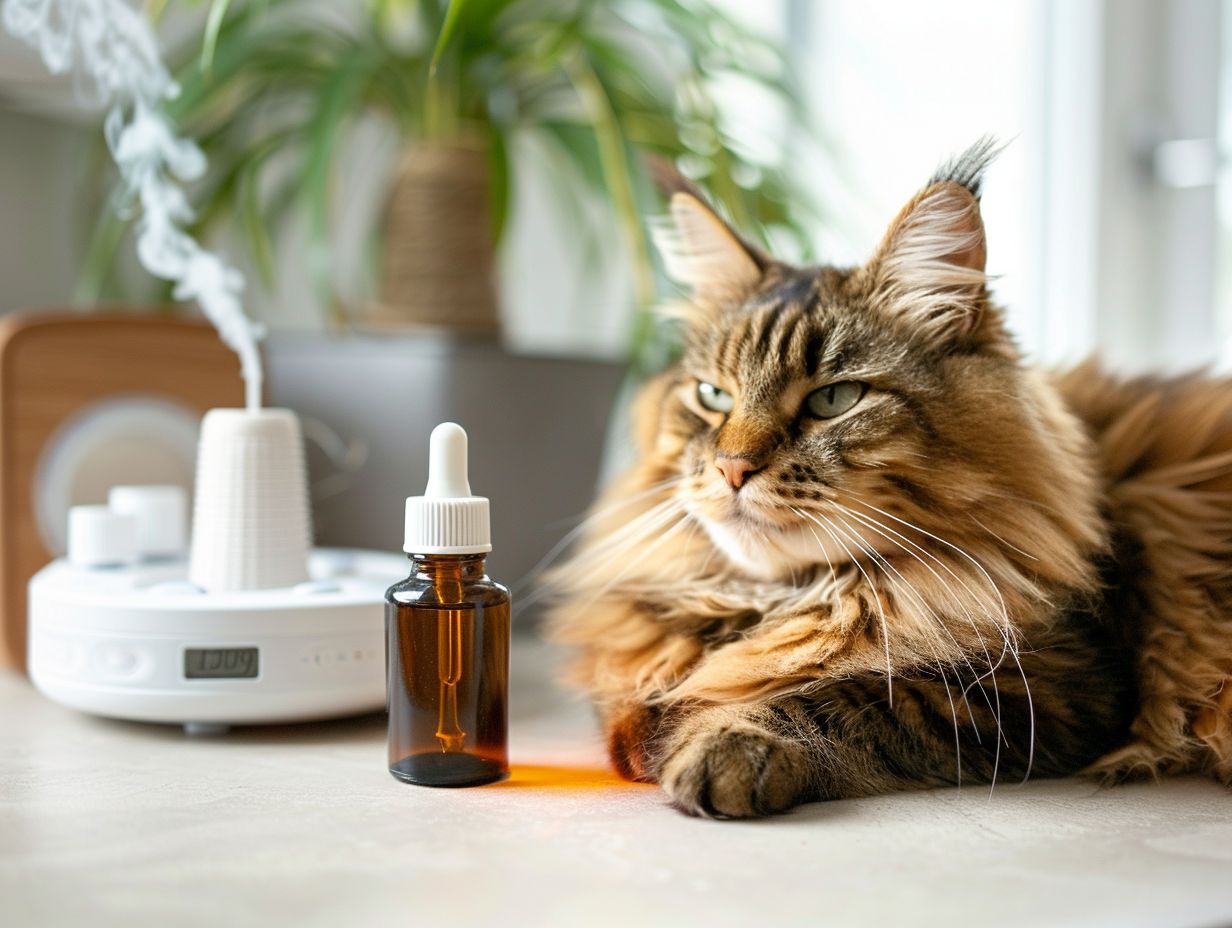
Aromatherapy sprays can be a convenient way to introduce calming scents to hospitalised cats. Veterinary nurses can use specially formulated aromatherapy sprays to create a pleasant environment that supports the emotional and mental well-being of feline patients.
One key benefit of using aromatherapy sprays in hospital settings for felines is that they can help reduce stress and anxiety levels in cats, which in turn may promote faster recovery times and overall well-being. By selecting appropriate spray products with natural ingredients that are safe for cats, veterinary nurses can ensure a gentle and soothing experience for their feline patients. Proper techniques for application and dosage are crucial to avoid overwhelming the sensitive senses of cats and to achieve the desired calming effect.
Creating a Calming Environment
Creating a calming environment through aromatherapy techniques is essential for hospitalised cats. Veterinary nurses can personalize the space with calming scents, soft lighting, and soothing sounds to enhance the healing atmosphere and reduce stress in feline patients.
Integrating elements of nature, such as indoor plants or nature-inspired artwork, can also contribute to a serene setting for cats.
Providing comfortable bedding and hiding spots allows cats to retreat and feel secure, supporting their natural instincts.
Regular observation of the cats’ responses to the environment is crucial in adjusting the setup to meet individual needs and preferences.
By creating a calming space, veterinary nurses facilitate a holistic approach to care that prioritizes the emotional well-being of their feline patients.
Frequently Asked Questions
Can aromatherapy be used to reduce anxiety in hospitalised felines?
Yes, aromatherapy has shown to help reduce anxiety in hospitalised felines. Certain scents, such as lavender and chamomile, have calming effects on animals and can help alleviate their stress levels.
How does aromatherapy work to reduce anxiety in hospitalised felines?
Aromatherapy works by stimulating the olfactory system, which is responsible for our sense of smell. When certain scents are inhaled, they can trigger a response in the brain that can help reduce anxiety and promote relaxation.
Are there any risks associated with using aromatherapy on hospitalised felines?
While aromatherapy is generally considered safe for most animals, it’s important to consult with a veterinarian before using it on hospitalised felines. Some essential oils can be toxic to cats, so it’s important to use them sparingly and choose ones that are safe for felines.
What are some of the most effective essential oils for reducing anxiety in hospitalised felines?
Some of the most effective essential oils for reducing anxiety in hospitalised felines include lavender, chamomile, bergamot, and frankincense. These scents have been shown to have calming effects on animals and can help promote relaxation.
Can aromatherapy be used as a standalone treatment for anxiety in hospitalised felines?
No, aromatherapy should not be used as a standalone treatment for anxiety in hospitalised felines. It can be used as a complementary therapy, but it’s important to also address the underlying cause of the feline’s anxiety and work with a veterinarian to develop a comprehensive treatment plan.
Is aromatherapy suitable for all hospitalised felines?
No, not all hospitalised felines may benefit from aromatherapy. Some may have allergies or sensitivities to certain scents, and it’s important to consider their individual needs and preferences before using aromatherapy. It’s always best to consult with a veterinarian before introducing any new treatments to hospitalised felines.

